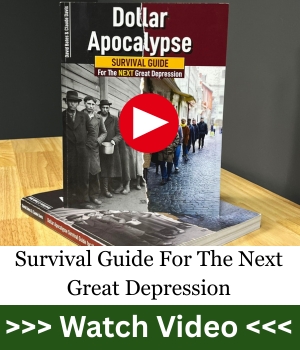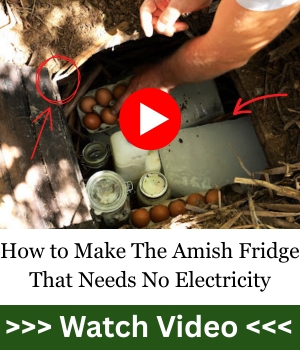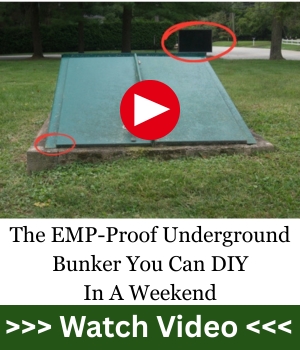For most Americans, retirement is one of the biggest worries they have. Giving yourself enough of an income when you don’t work anymore is a challenge. Building up the funds to last you through the rest of your life takes money that a lot of us just can’t spare. In fact that raises an important point – considering how important it is to prepare for retirement, can you afford to divert any money into more general preparedness? Or is this the wrong question?
Personally I think it’s the wrong question. I don’t see a choice between retirement planning and prepping, because there’s a lot of overlap between the two. Prepping is actually a major part of your retirement planning, because the steps you take to be ready for a crisis are also going to help when the time comes for you to put down your working tools for the last time.
The truth is, retirement and the S hitting the F have a lot in common. Sure, they have a lot of differences too. One is predictable and, done right, can be an enjoyable and fulfilling part of your life.
The other is unexpected, a crisis, a disaster – that’s why we don’t talk about the cake hitting the fan. At their core, though, both are major changes in your life that you have to adapt to and overcome, and the same skills and ways of thinking can be applied to each of them. Let’s look at some of the ways prepping can double as retirement planning.
Cutting Out Waste
Preppers hate throwing anything away. Canned food that’s still safe to eat, but has lost its flavor? Throw it into a soup or stew. Bought a new generator? Hang on to the old one as a backup. Broken a chair? Keep it in the shed; you can maybe fix it up, and at worst it’s extra firewood.
That same habit of avoiding waste will also come in useful in retirement. Most of us are going to see our incomes drop when we retire, and that makes avoiding waste essential. Why throw something out if it can be repaired, repurposed or stored in case it’s useful in the future?
We’re not talking about becoming a hoarder and living in a house full of junk, but a sensible prepper takes a good look at things before throwing them out. If it still has some use in it, why not keep it?
If you’re retired and on a fixed income, fairly small expenses can be a blow. Say you tear a pair of pants so badly they can’t be repaired. Buying a new pair could put a hole in your weekly budget – but if you can dig in the back of the closet, and pull out an old pair that still have some wear in them, you’re good.
Staying Active
How many people do you know that, as soon as they retired, just seemed to run out of energy? We all know the stereotype – the older couple that just sit on the couch all day, never doing anything more active that arguing over the TV remote.
It’s easy to sink into that sort of lethargy when you retire. For forty years or more you’ve been used to a busy routine, then suddenly it’s gone. You don’t have to get up early anymore. You don’t have to plan your day, manage your time, get tasks done to a fixed schedule. Why not just sit there for a few hours and channel surf?
Prepping will keep you out of that mindset. When you’re looking ahead and working out how to get through a potential crisis, your mind stays active. The fact is there are so many potential crises that you’ll never do everything you can to be fully prepared for all of them.
We just do our best to be as prepared as possible for as many as we can, and rely on our initiative to get us through anything unexpected. That means you’ll always have something useful you can be doing. And wouldn’t you rather be doing something useful than sitting there staring idly at the idiot box?
Related: 23 Motives to Prep Even If Doomsday Never Arrives
Want a Retirement Home?
If your preparations involve a bugout location, that can open up some interesting options for retirement. We all have different ideas on what a BOL should be, from fortified retreats to greenfield sites we can build on after a crisis hits. For many prepper it’s a cabin or old farmhouse in a remote area, and these people often get double use out of their BOL – as well as the refuge they plan to use in a crisis, it’s a vacation home right now.
Once you’re done with work, your vacation home can double as a retirement home. That lets you release more money by renting out or selling your main home, and it also gets maximum value from the investment you made in your BOL.
Get Rid of Debt
The next big crisis might be an EMP attack, civil unrest, a disease pandemic or the eruption of the Yellowstone supervolcano – but it’s more likely to be another financial crisis. That’s why most preppers focus on reducing their debts, with the aim of completely eliminating them.
If a financial crisis hits, the last thing you want is a lot of debt. It opens up a range of vulnerabilities that can turn a bad situation into a personal disaster. That’s why preppers should always be aiming to cut borrowing to essentials, and pay off existing debts as fast as possible.
It’s just the same when you retire. Debt payments that are manageable when you’re earning become a lot more of a burden when you’re on a reduced, fixed income.
If you can manage to be debt-free on the day you retire, the rest of your life is going to be a lot less stressful – and, with none of your income being sucked up by creditors, a lot more comfortable too.
Related: 10 Great Depression Era Strategies For Saving Money
Stay Confident
Prepping might involve a lot of stockpiling food and setting up backups to things we’ll lose when society collapses around our ears, but what it’s really about is confidence. That root cellar full of food gives you the confidence that when the grocery stores are looted, empty shells, you and your family won’t go hungry. Your generator gives you the confidence that with the national power grid destroyed by an EMP, your lights will stay on.
Retirement is a blow to many people’s confidence. After a lifetime of work, and being able to value yourself for your skills and achievements, you’re suddenly faced with the big question: Now what?
If you’re focused on being ready for anything, you still have a goal in life. There are still things you want to achieve, and new knowledge you want to gain. Retirement isn’t the start of an inevitable decline towards senility and death; it’s an opportunity to spend more time getting ready for the worst life can throw at you, so face it with confidence!
At the end of the day, retirement and TEOTWAWKI are both things we should all be preparing for. It’s no surprise that many of the same attitudes, habits and skills help us be ready for both. If you’re an older prepper you can be happy with the thought that you’re not just hedging your bets against something that might happen; you’re setting yourself up for something that will happen.
You may also like:
 Prepping on a Budget – How To Get Survival Supplies When You Have Almost No Money
Prepping on a Budget – How To Get Survival Supplies When You Have Almost No Money
10 Medical Supplies You Need To Stockpile Before It’s Too Late (Video)






















I retired 4 years before I intended to because the hospital I worked for closed. I had planned on working to 72 and then taking it a year at a time to see where I wanted to retire, At 83 I think I could still do my job, but refuse to move to job offers. The early retirement set us back a couple years in paying for 2 trucks, but once paid off we were soon able to pay off the home mortgage. That sure helped. I did plan for at least 3-5 retirement checks, so we are much better off than some others. Plan from the first day of your first job. Save if it is only $1.00 a payday. Our daughter never spends a $5.00 bill. This year she bought a new Toyota Tundra pickup and paid for it with $5.00 bills. In the SHTF situation junk becomes gold. Barter will make it worth keeping old, but working things.
Another way that folks can help themselves now, and during retirement, is to examine what you intend to purchase. There are two types: 1) Needs 2) Wants.
Back in the 19th century, Henry David Thoreau said, “We make ourselves rich, by making our wants few.”
He was right.
People always look at me funny for all the food I have stored and all the other dry goods (toilet paper and such.) They scoff and aks “Are you some kind of prepper? You think the world’s going to end or something?” I just say, “Yes, I’m some kind of prepper” Then explain how my husband and I went for 2 years with no income and how hard that was just to get the bare necessities. I then tell them that I’m not going through that again! I explain that retirement is coming on fast (we’re late 50’s) and buying what I can while I can just makes sense. Why spend money I don’t (won’t) have on things like TP then, if I can buy it with no pain now? It’ll keep. Though I will say that it tends to take up a lot of room so I switched to baby wet wipes. Cheaper and a lot less space! I probably have about (no kidding) 10 years worth now. Soaps of all kind- 5 years. There’s no sense in having to buy them later at (most assuredly) a higher price when my income will be only a fraction of what I have now?
You know what? After I talk to them for a short while, they don’t look at me so funny anymore!
Bravo, KCK!!!
BRAVO!
Am I missing half the article? I only count five. Oh well, glean from what was shared
I so agree with KCK. I went through a job loss and extended unemployment experience, and it was preps that got me through. Still working to get the stores back up. And it totally makes sense to me that one’s preps make for an easier retirement. I personally will end up working well beyond the day I die, not due to debt, but because that extended unemployment also wiped out what I had put back financially as well.
“I personally will end up working well beyond the day I die” …. That would be quite a trick.
As KCK and Grammyprepper have done, I used some preps in unexpected situations. Even though it means working up stores, again. It is a great way to rotate and update those stores.
Sue F,
Rotating stores are important and often the one thing we can forget about. With the exception of long term packed items like grains, rotation may be one of the most important things we do, at least for food items. Better to not ”have” to use them; but, like any insurance, good to know it’s there.
A great article! There are all kinds of unexpected situations that, while not a general SHTF, may very well be a personal SHTF, as Fergus’ article points out and some of those above have experienced.
There’s another dimension to preparedness that we don’t discuss that much, and that’s the sheer ease of going down to the cellar for another jar of pickles, or soap, or toilet paper at your leisure. Not having to go out into a driving rainstorm, or cold, or windstorm, or whatever nature hurls at us, or when we feel under the weather or too pressured by others’ needs or projects, is a liberating experience, every time!
Or an angry mob. Stay secluded from the masses especially from Black Friday until about Jan. 10
The best time to start prepping and to save for retirement is the same: ”Yesterday”
Starting with my first job out of college, I put money into my company 401K, at least to the point they would match. Often that made cash a bit tight, so vacations were few, and knowing how to cook was important, since it made eating well an inexpensive proposition. In your 20’s your 60’s look to be in the distant future; but, they will arrive before you know it. From 1973 until 1986 I only rented a house a total of 7 years, and ended up purchasing both of those houses. They were fixer uppers; but, living in each for 2-3 years made the fixing a known quantity, and when I sold the 1st one, I was able to pay off the 2nd, where we now live.
Knowing how to do most things from carpentry or plumbing and electrical also helps a lot.
You also need to take advantage of any and all discounts or services available to seniors. We don’t eat out often; but, Wendy’s offers a free senior drink, so a couple of sandwiches, an order of fries and drink is rather inexpensive. Wendy’s and other places often have surveys you can take that save you something on your next visit, so be sure to take the time to do them.
Ohio has a ”Homestead Exemption” if one of the household members is 65 or older. This cut our real estate taxes in half, so be sure to check for anything like this in your jurisdiction.
The question is valid and the answer has to be: “YES”; but, keep in mind that living in one place for a long time, means that paying off that mortgage is itself a payment on your preps, and a little extra paid now means more money in your pocket later when it might be more needed.
I agree and having a paid off home with most everything you need on hand saves money when you may least have it. Personally, in retirement the wife and I have 5 monthly income sources, plus a large account we use as a slush fund to make major purchases.
Another thing we do that helps a lot is heavy; but, judicious use of a credit card. By understanding the billing cycle and always paying off the balance, we accrue points that we cash in for ”Free” gift cards. In our case it’s generally Home Depot and these cards have over the years purchased a new refrigerator and chest freezer and heavily defrayed the cost of 2 new exterior doors with attached storm doors. This summer we will be building a deck at no cost but our own sweat.
Cutting Out Waste
This is where rotating your food is important, using up things as they are replaced so stews are planned and not a desperation meal for old food.
We have two extra generators that are for sale with the cash going into maintenance on the genset we use. Any wood can be used to heat as can all of those corrugated boxes from all of that Amazon and other stuff. Cut into strips, soled and tied with string and you have additional firewood. Wet them so more can be rolled tighter, and thenlet them dry and you have an even better version of that log.
The key here is to save when you can so the difference in retirement income isn’t that great from your employment income minus savings, that can also be used in retirement. Cutting your expenses significantly will allow that smaller income to not seem to have shrunk as much. Keep this simple rule in mind: ”If your outgo exceeds your income, then your upkeep will be your downfall.”
‘Nuff said.
That should be everyone’s attitude.
Keep in mind that there is “Junk” AKA trash and “Junque” unneeded but potentially useful for future projects. Think out of the box and know the difference.
Unless you’re talking about dress pants, they can probably be mended and in retirement you generally have a monthly budget not a weekly one. I have jeans that are so patched they have come back in style. LOL
Staying Active
Prepping / Homesteading often involves animals like chickens and gardening with no time to sit around. Walking the property is a nice way to spend an evening, and wood always heats twice, Once in the cutting & splitting and once again in the burning.
This is where animals can be a lifesaver, since retirement only means you don’t have to get up as early to do the chores before work. I know of few farmers or preppers that can afford to just sit around.
I disagree; but, that’s because planning is constant using a <strong””Threat Matrix” that I will detail at the end of this post.
The most important companion to our idiot box is the DVR, since it collects the things I want to see and allows me to watch them on my ow terms and when I have some downtime.
My BOL and my BIL are the same, since we decided 35 years ago that this was where we would put down roots. We will not only shelter in place; but, have others in our MAG that will potentially be coming here. Most all of those people are younger and in some cases have skills we either do not have or that we have not yet perfected. Community will be essential.
Get Rid of Debt
We paid off the mortgage more than 20 years ago; but, have taken on some unsecured debt for items wee needed often @ 0% interest. Long term anyone can do this by being frugal and planning.
And for the debt you do have, it should be unsecured or the security should be something other than your house & property.
We are on a mostly fixed income; but, not all that reduced from what we had pre retirement. That of course takes planning and learning to live well within your means well before retirement.
When we look at the shelves of canned goods, the pantry full of long term food or the fireproof box with cash on hand, it is a good feeling, that could be called confidence..
Long before I retired I started teaching classes and volunteering for local organizations, so other than not going to work, I still keep much of the same routine. As an engineer (EE) I was also a ham operator and played with computers and other electronics for fun. I still do those things; but, now on my own time and for no additional pay.
Keep doing it
When prepping is a lifestyle as mind has been for 40+ years, retirement simply gives me more time to do the things I didn’t have time for while working. The problem is that often you add more projects to the list than you will ever complete. LOL
I did and I am. For you not yet there, it will come too soon, so get to it.